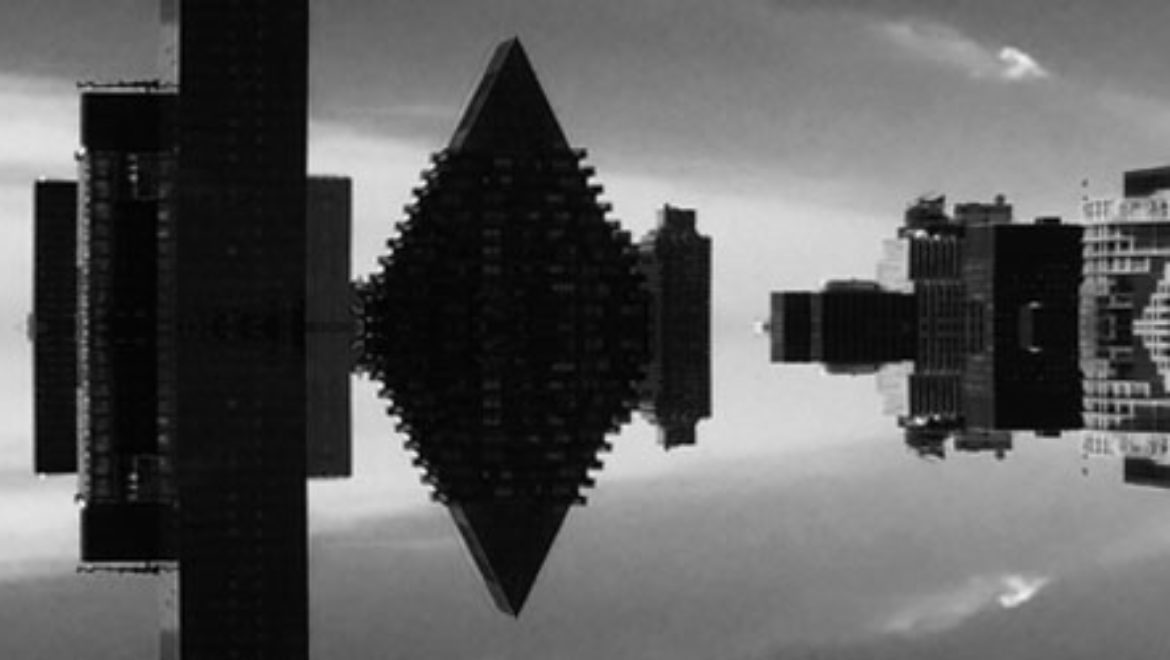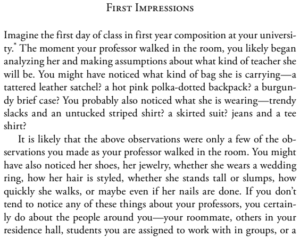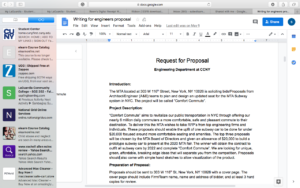DR #14



Tuesdays 5:00-6:15pm | North Academic Center Library 1/301Y [email protected] | (646) 801-1462



Catches our attention as student!
Black Mirror: “San Junipero” and “The Entire History of You”
These Black Mirror episodes share the common theme that technology will be our downfall or something else. In “The Entire History of You” we see how technology backfires. You literally able to relieve your most moments. Black Mirror is using sort of a scare tactic to get us to wake up and realize that all this technology will be our undoing. Each episode is faced with different characters and different issues.
I believe that the technology portrayed in “San Junipero” can be best described by the social construction of technology. This theory goes on to explain that social structures (created by humans) go on to shape the development of technology, rather than the other way around. I think this perfectly describes “San Junipero” because humans feared death and the unknown after life, so they developed a technology that helped them escape the inevitability of death.
Whereas, the “Entire History of You” episode has got several communication concepts that are depicted in the movie, this notion clearly help us to understand and interpret what we see in the media. The episode is an alternative reality depicting that most people have “grains”. This grains record everything they see, do, speak, hear and see. This allows them to play back every memory that they have. Communication concepts portrayed in the episode, makes us clearly comprehend the entire plot.
Obtaining technology that allows you to record and re-evaluate your memories and experiences would be rather unique and intriguing but could string along with its consequences and dangers. Your secrets would never really be safe. Relationship fights would end up consisting of both partners replaying memories to catch the other in a lie or to visually bring up past fights. Inevitably, it would lead to an obsession. People wouldn’t want to live in the moment because of the off chance that something bad could happen. They’d rather relive happy memories where they’re guaranteed to be content. With that, this small little chip holds your entire life, everything you’ve ever done. That’s kind of scary. What happens if it becomes removed? The government seizes it.? What if it’s hackable? If someone else can hack into your chip and essentially download all your memories, what happens then? The opportunities that arise that they can do with it are endless. No secret would ever be safe.

She was caught by husband in memory chip!

Hypothetical happiness!
For our project in group #3, we’ve revised and edited the original planning of Leonce’s Architecture to address all concerns pertaining to how we can construct infrastructure to maintain a safe environment whilst ensuring long term sustainability. We went about by spittling the workload between the group. I was the contractor of the group and addressed all concerns of costs and price deficits with my group members. Personally, I loved working on this project and I felt like we nailed every bullet point required to maintain a sustainable infrastructure according to modern state laws of protection and construction. I am giving every member in my group a 97 for not only the work but effort as well. I am giving myself a 97 as well. I felt as if we were able to write our points very well but we couldn’t address all concerns to the audience. Overall, it was a fun project!!
Black Mirror Season 3 Episode 1: Nosedive
The episode of Black Mirror “Nosedive” is set in a world where everyone is connected to their phones and they rate each other from one to five stars for every interaction they have, which can impact their socio-economic status.
The main character is a young woman named Lacie who is consumed by her ratings. She gets an opportunity to make her ratings skyrocket by being the popular childhood friend’s maid of honor for her wedding. Her obsession leads to several mishaps and causes rapid decrease in her ratings. In this world you need a high rating if you want to buy the nicest houses or the nicest cars which is almost like having good credit. Even something as human as accepting coffee from anyone who is below a 3 could bring down your own rating.
I really enjoyed watching this episode because it makes you take a step back and realize how obsessed our generation really is with technology, our phones and social media. This episode teaches you that we should not always care what people think about us or how they perceive us. We should let loose and scream a little sometimes. Which is exactly what Lacie does toward the end of this episode. Once Lacie arrives at the wedding she sneaks in and manages to say a speech, but she becomes extremely upset to the point everyone negatively rates her and security comes and arrests her. She is taken to prison; the rating system is removed from her eyes and they placed Lacie in a cell. She gets into an argument with a man in a separate cell who’s in the same position as her, and both realize how liberating it is to speak your mind without worrying about being rated.

Emotional Speech and Reality

How they perceive us!
“The Offspring” From Star Trek
Artificial intelligence and artificial life have long been a controversial topic among scientists, psychologists, and many others who study human life and development. The main issue is differentiating artificial life from natural life, particularly in the case of human beings. Regarding artificial life, we often come to the dilemma of where artificial life ends, and where natural life begins. If something is sentient is it alive? Is a robot that can effectively communicate with a human being alive? Or are there other factors?
“The offspring” is the name of the star trek the next generation episode, in which Data, an android aboard the enterprise, creates an artificial being. Data created the offspring and programmed it with the ability to act almost human, much like Data. Data also considered the creation to be his child, and when confronted about it he claimed that he had as much right to “procreate” as the human members of the enterprise did.
Data creates his offspring in the belief that if any the members of the crew had decided to have a child, they would likely have not been met with any opposition. When confronted about the creation of his “child” he claims that once he had been accepted as a sentient member of the crew, he had also gained the right to “procreate,” however since he cannot procreate in the fashion that humans can, he just created his own child in the fashion that he could.
Lal is interrogated by Haftel later in the episode. During this interrogation scene, she begins to showcase more of her ability to have emotions. She expresses a strong desire to stay on the enterprise with Data, whom she calls her father, and the rest of the crew whom she is friends with. Although Haftel is too close minded to accept that a robot can display these kinds of emotions, it is very evident that Lal is capable of feelings. This is confirmed in the scene directly after when Lal visits Troi in his room after being interrogated. A clearly confused and distraught Lal is soon overwhelmed by the emotions that she is feeling and returns to Data’s lab. These few scenes in the episode play a role in showing how thin the line between real human emotions and “artificial” emotions can be. If this event were to happen, it would be difficult to argue that Lal would not be able to pass as a human being.
Although humans today have not been able to create a robot as sophisticated as Lal, it is only a matter of time before technology catches up to the imaginations of human beings. When it does, the philosophical line between artificial life and real life will become blurred. It will be impossible to break the scientific barrier as robots will probably never be made up of cells, but it will be difficult to look at a robot with these emotional capabilities and not at least regard it as a human being.


Very evident that Lal is capable of feelings!

Project Proposal

portfolio